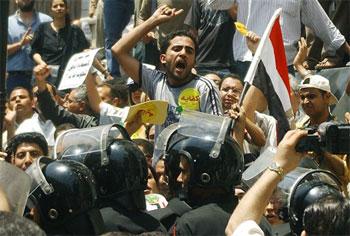For three decades, the citizens of Egypt have been held under a state of emergency, according to National Public Radio. Now, following the successful protests in Tunisia, Egypt has reason for the state of emergency.
On Jan, 25, over 20,000 protesters moved onto the streets of Cairo, calling out for Mubarak’s removal reports CNN. Protesters, defying curfews, have continued the protests, called by many the “March of Millions”.
“They’re tired of living in a country they don’t feel is their own,” said Jason Brownlee, an Egypt expert at the University of Texas in Austin, to National Public Radio. “They are treated as subjects by their government, not citizens.”
The protests follow what many called a corrupt election last November and a drastic increase in the cost of living, reports CNN.
“There are many who just barely have enough money to get by and, as things became more expensive, they are finding it hard to make ends meet,” said a source living in Cairo who has asked to remain anonymous in an e-mail interview.
According to CNN, the protests seem to have been organized and kept up to date using social networking sites such as Facebook and Twitter. In response, the government shut down the Internet in Egypt.
Despite the military declaring it would not fire upon the demonstrators, violence has struck between pro-Mubarak and anti-government factions, reports The New York Times. According to U.N. estimates, over 300 people have died due to the unrest.
There are allegations that the pro-Mubarak camp is paid by the government, according to CNN.
“I would not be surprised that they are, in fact, government-hired,” said first-year Lucas Miller, who lived in Egypt for five years, in an e-mail interview.
“The government being this violent and seemingly irrational in how it handles things, I guarantee, is nothing new,” Miller said. “It’s just finally being shown to the world.”
Egyptian Prime Minister Ahmed Shafiq, while admitting that the attacks appear to be organized, insists that the Egyptian government is not behind them, reports CBS.
“I apologize for everything that happened yesterday because it’s neither logical nor rational,” Shafiq told Egyptian state TV. “Everything that happened yesterday will be investigated so everyone knows who was behind it.”
On Feb. 4, Mubarak declared that he would not run again in the September election. According to CNN, Mubarak fired his entire cabinet and appointed new officials.
However, the protesters are still crying out for Mubarak to leave office immediately.
Mubarak refuses to leave.
“I would never run away from this country. I will die on this soil,” said Mubarak to ABC.
Mubarak says that he fears chaos if he leaves office.
“Orderly transition must begin now,” President Barack Obama said in a speech. According to The New York Times, Obama has been very involved in the events occurring in Egypt, making calls and even bringing Mubarak and his top aides to Washington to discuss the matter.
U.S. interests in Egypt are clear. Egypt has been a longstanding ally of the U.S. in the Middle East and has control of the Suez Canal, a critical passage for oil.
“The Suez Canal runs right through the middle of Egypt,” said Assistant Professor of Business Management Deena Burris. “An uprising in Tanzania is not equal to an uprising in Egypt, because in Egypt we have a lot more economic ties, a lot more cultural exchange, and the Suez Canal.”
Americans can feel the effects of the protests on the U.S. when they fill up our cars.
“Immediately the oil through the Suez Canal is going to be delayed, which is going to impact oil prices, which will filter down into gas prices, immediately affecting people in Greensboro,” said Burris.
According to CNN, key members of Mubarak’s regime, including his son Gamal Mubarak, have stepped down. The new Vice President, Omar Suleiman has started talks with the opposition parties on possible constitutional changes.
Shafiq says that stability is returning to Egypt, reports NPR, despite a 100,000 strong demonstration on Feb. 4, aiming to force out Mubarak.
“We haven’t been affected and, God willing, next Friday we won’t be affected,” said Shafiq to National Public Radio. “All this leads to stability.”
According to NPR, Shafiq has been discussing with leaders of the protests how best to transition Mubarak out of office. A popular proposition involves the powers of the president being placed on Vice President Suleiman, while Mubarak keeps his title.
Meanwhile, the protests still continue.
“I think these protests are a huge, unprecedented change for Egypt, and some change that has been long overdue,” said Miller.
“For the first time, the entirety of the Egyptian population came together with one voice, one interest, and there was no conflict between the social classes or religious belief,” said Miller. “I think Egypt’s future — while immediately it will be slightly chaotic and possibly faces many struggles to rebuild — is more promising than ever.”

